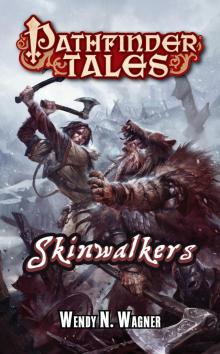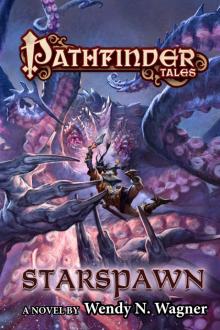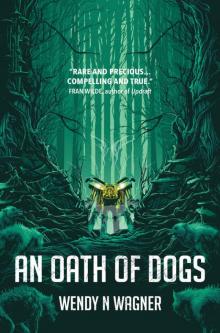- Home
- Wendy N. Wagner
An Oath of Dogs Page 6
An Oath of Dogs Read online
Page 6
But after spending the last two days stuck in the office, Standish figured she was just lucky to get away from the endless stream of friendly visitors. Out here, she was blessedly alone, just her and Hattie. She risked glancing at the farms crowding up against the shoulder of the road. Their fields rolled out in broad expanses of sunshine-sucking grass. With no trees, there was just too much open space for Standish’s comfort. She wiped her palms, one at a time, on her pants.
The bright colors of the Believer farms were a welcome distraction. The crisp white paint made the many-colored crosses beside the windows and on the doors looked exceptionally vibrant. Beside fences and gates dotted with more of the colorful crosses, old-fashioned aluminum mailboxes gleamed like something out of a historical drama — the only way, Standish realized with a jolt, the outside world could send these folk communications. Meeting announcements, voters’ guides, even the local news got screened through these ancient contraptions. For these people, her job didn’t even exist.
Standish slowed to a stop for a girl to lead a brown cow across the rutted excuse for a road. The girl stopped to wave at her before breaking into a jog. The cow trudged behind, lost in its cud.
Standish shook her head. The smile and the wave were like any other eight or nine year-old kid’s. Believers looked ordinary enough, no matter how different their lives really were.
Ahead, the road grew even narrower. Standish eased the cruiser to the farthest edge of the track and drew out her map. It looked like this road continued a few more kilometers, passing a couple of small homesteads before ending on the edge of Sector 12. There were logging roads that went farther, but she’d have to double back to find their entrances, and she’d have to cross private property lines in a few locations. She’d stick to this track and then try to follow Duncan’s notes about walking trails.
She drove slower now, trying to get a sense of the place. Despite the distance from the mill, the occasional house appeared like an apparition in the trees. The forest crept closer to the road, blotting out more of the sky with every meter. Branches scraped along the roof and sides of the rig.
The road ended as if the overgrowth had grown tired of chasing the gray-graveled thing and simply swallowed it up. She stopped the UTV and wondered if she ought to leave the flashers on. There was no place to turn around, and anyone driving through the greenery would never see the cruiser in time to stop.
She gave a bark of laughter. Who the hell was going to rear-end her? She was at the end of civilization on the very border of the explored universe. She grabbed her gear and opened the door, still laughing. Hattie squeezed out behind her.
“Hello, lady.”
Undergrowth rattled and snapped. Standish laid a hand on her tool belt. A pale figure scrambled under the lowest tree branch and out onto the road, all wild white-blond hair and stained khaki.
“Can I help you?” Standish snapped.
The figure pawed at the tangles of its hair, and she realized how small it was, how thin the arms were. The clothes hung on the little thing like cast-offs on a scarecrow. The hair parted to reveal a smudged and dirty face with a ridiculously pointed chin. “I’m Olive Whitley. You must be the new communications manager.”
“Kate Standish.” She put out her hand with some amusement. The kid was probably ten or eleven, but she had the gravitas of someone much older.
“I know your name, Miss Standish. It just escaped me for a moment.” The girl tugged an elastic band off her wrist and bound back the explosion of hair. A few green bits stuck out of the top of the ponytail.
“Do you live around here?”
“My folks have a place just down the road. Actually, I wouldn’t mind a ride. My shoes are wet from last night’s rain, and I’d just as soon be done walking for the day. Blisters are the one thing that will send me out of the woods.” She had already moved around the front of the UTV and opened the passenger side door. “Your dog looks nice. What’s her name?”
Standish waved the dog back inside the vehicle. “Her name’s Hattie.” She slid into the driver’s seat. She didn’t really understand kids, but she knew she couldn’t just leave this one out here in the woods alone, no matter how curious she was about Duncan’s Sector 13 mysteries. “You like dogs?”
Olive looked at Hattie for a long moment, her dark eyes serious as she studied the animal. Her skin and hair were nearly white, making her eyes like holes in her thin face. Standish couldn’t help wondering what the hell was wrong with her parents, letting her wander around in the woods with nothing to eat and wet shoes to wear.
“I’ve never seen a dog up close before. They’re not much like sheep or cows, are they?”
“No, dogs are pretty different.” Standish struggled to keep the laughter out of her voice.
“Can I touch her?”
“Yes, if you’re gentle. Hattie loves to be petted.” Standish smiled as Olive put out her hand and Hattie allowed the girl to stroke her white neck.
“She’s not as fluffy as a sheep, that’s for sure. But she’s much softer than a cow or even Mr Matthias’s horses. And he’s very good about brushing his horses. They’re by far the softest in Canaan Lake.”
“Mr Matthias, huh?” Standish started the cruiser and backed a few careful yards before attempting a three-point turn that crunched brush under the cruiser’s treads and made branches squeal on the roof. The motor pool was not going to be happy with her. “Do you know everyone in Canaan Lake?”
Olive leaned sideways in her seat until her nose touched Hattie’s black one. “Her nose is wet.”
“That means she’s healthy.”
She sat back in her seat and was quiet for about half a klick before she remembered Standish’s question. “I know most folks. It’s easy meeting people when you spend as much time traipsing as I do.”
“‘Traipsing’?” The UTV hit a pothole with a particularly nasty jolt.
“That’s what Miss Sycamore, the school lady, calls it. It’s got a nice sound, don’t you think?”
So she did go to school. “Yes,” Standish agreed. “A wonderful sound. Olive, where am I taking you?”
“My parents are in the next house. The one with the blue tarp on the roof, not the orange one. That’s Mr Malik’s.” Olive pointed up ahead. “You can’t really tell from here, but Mama’s got a greenhouse. She buys horse shit from Mr Matthias and chicken shit from the Caldera farm. She’s gonna grow oranges someday, she says. You ever have an orange, Miss Standish?”
“You can call me Kate. And yes, I’ve had oranges. We even had an orange tree in our greenhouse.” The house with the blue tarp came into view. It was smaller than Standish’s own house, and the walls looked weather-worn, slanting away from the road at an awkward angle. It didn’t look like they’d bothered to build a foundation before they printed it, and the plastic had shifted and buckled in places. This wasn’t company housing, that was for certain. Songheuser wouldn’t let its employees live like this.
“My mama grew up with her own orange tree, too, Miss S— Kate. She’s from Lompoc, California. She misses it, too.” The cruiser hadn’t even stopped, and the girl was already reaching for the door handle. “She’ll be glad to hear I met you and that you’re nice. She misses Duncan Chambers.”
“You knew Duncan Chambers?”
But the girl had already jumped out of the cab and was racing toward the front door of the ugly little house. Standish stopped the engine and followed after her.
“Olive,” she called. “Olive!”
The girl vanished inside. Standish paused on the bottom step of the porch for a moment, and then went up to the door, motioned for Hattie to sit on the top step, and knocked.
The door opened and smells of pot roast and fresh bread wafted out. Standish stood rooted for a moment, caught in olfactory awe.
A face looked out at her, the high cheekbones and pointed chin strongly resembling Olive’s. Her red hair looked natural. “Can I help you, ma’am?” Polite, but not friendly.
Standish came back to herself, keenly aware of the rehydrated oatmeal sitting in lumps at the bottom of her stomach. “I just dropped off Olive, and I wanted to make sure there was someone at home.”
“I thought I heard Olive come through here.” The woman’s smile turned real. “Come on in.” She put out her hand. “Melissa Whitley. You must be Ms Standish.” She caught Standish’s expression and chuckled. “The grapevine works fast around here.”
Standish slipped inside. The house’s shabby exterior belied the comfortable main room, where bookshelves and colorful quilts fought for wall space and a table filled with dried botanical specimens took the place of an entertainment system. A thick stack of drawings caught Standish’s eye; the top piece was a detailed pencil sketch of a tree scooter.
“Olive’s work,” Melissa explained. “She’s got an amazing eye.”
“Pardon me for asking, but shouldn’t she be in school? It’s not some kind of holiday, is it?”
“Coffee?” Melissa didn’t wait for the answer, but turned into the small kitchen and brought out a couple of mugs. “Olive goes to school when she wants to. She eats when she wants to, she sleeps when she wants to, and she does what she wants.” She offered a mug to Standish, who took it and sipped reflexively. “Olive’s not like other kids, Ms Standish. Her mind is exceptional.”
“Don’t you worry about her?”
“Of course I worry. But I might as well worry about whether the sun will come up tomorrow.” She took a long drink of her coffee, studying Standish over the rim of her mug. “I could see the look in your eyes when I opened the door. You saw our house, you saw Olive, and you made up your own mind about us. Yes, my husband is a logger. I work night shift at the mill. But we’re not trashy people.”
Standish wished for Hattie at that moment. Everything was so much easier when she was beside Standish. “I didn’t say you were. I’m just new here, remember? And Olive’s not like any kid I’ve ever seen.”
“She’s not like any kid anyone’s ever seen.”
Standish hesitated. She wasn’t sure why she was checking up on the girl or trying to make nice with her mother. Maybe it was because she remembered herself at that age, giving the latest nanny the slip, escaping into the sewer system and the city parks. There had been whole weeks during winter and summer break that she’d gone from schoolmate’s house to schoolmate’s house, and only the cook’s concerted unhappiness had brought her back into the familial fold. Olive wasn’t so different from the kid Standish had been.
“Miss Kate! I didn’t realize you’d come in. Mama, did you know Miss Kate had an orange tree growing up, just like you did? Isn’t that some coincidence?”
Melissa looked from her pixie-faced daughter back at Standish. “It seems we have something in common, after all.”
“It seems we have.” Standish took another drink of her coffee and tried not to like the Whitleys too much.
AT THE INTERSECTION of First and Main, Peter stopped walking and picked some horsetail fronds out of his shirt collar. His boots were muddy, but that was normal for Canaan Lake.
Miguel Alvarez’s face had stuck with him over the last night. He was on his way to talk to Deputy Wu and see if all the mess with the bones could be settled.
He took a right on Main Street, and then a left on Founders Way. He could see the school sitting at the top of the hill, the tiny outpost of the library beside it. The sheriff’s office sat drab and lonely on its side of the street, the only two-story building in town. They kept the drunk tank on the ground floor. Any dangerous prisoners were shipped out to Space City as soon as they were caught.
The stairs, running up the outside of the building, creaked under his weight. If it weren’t for the gritty length of anti-slip tape laid on the edge of each step, he would have worried about falling off the flimsy thing. It said something about a town when its police station looked this makeshift.
He pushed open the door to the smell of overcooked coffee and steaming rain jackets. He didn’t see Deputy Wu at the tidily crowded desk on the far side of the room.
“Pete Bajowski! What brings you to my office?”
Sheriff Vargas herself stepped out from behind her wide desk. The door frame had blocked his view of her. The smile on her face made her normally round cheeks look even more full.
“Sheriff Vargas, you know I prefer ‘Peter.’”
She tapped her temple. “This memory of mine. I’ll get it straight someday, Dr Bajowski. Sorry about that.”
He forced a smile. “I just thought I’d follow up on those human remains I found the other day.”
She waved him toward the stiff little chair in front of her desk and returned to her own seat. Everything about Maria Vargas sparkled with a certain earthy friendliness that read as genuine. Peter knew she’d spent five years in law enforcement back on Earth and then spent three more in special security at Songheuser’s North American offices. He tried to keep that in mind whenever he dealt with her.
An ashtray, a cut glass relic from pre-space times, sat at her elbow full of paper-wrapped wads of chewed gum. She gave a little laugh. “Now, Peter, we don’t know that thing was human. Could have just been some sheep bone dragged in from a field.”
That wasn’t the impression he’d gotten from Deputy Wu when he’d dropped off the thing. Peter reminded himself to keep his friendly expression glued in place. “You know, Miguel Alvarez approached me the other day. Said his little boy was dug up a few days ago. Frank hasn’t recovered all the remains yet. Think maybe I brought in one of Luca’s bones?”
The sheriff took a pack of gum out of her desk and put a stick in her mouth. “Could be, I suppose. Guess I’ll know in a week or two, when the ME makes it out from Space City. Gum?”
He shook his head. The smell of cinnamon and sugar fought for dominance with the other scents in the room. “A week or two?”
“Identifying old bones is pretty low priority right now.” She sighed. “It looks like two dozen people died over there in Jawbone Flats. Nagata Company’s CEO is screaming at local law enforcement. Hell, I sent Deputy Wu over there to help out. We’re short-handed enough out here without a man down — you better hope nobody needs any help with anything.”
He cleared his throat. “How long do you think it’ll take to track down the ...” He wasn’t sure what the right word was. “Perpetrators?”
“Perpetrators. Oh, you make them sound like they’re just ordinary criminals, maybe a bunch of kids playing a prank. This is going to take a while. These aren’t just ordinary thugs. They had a mission. A plan. A cause.”
She was chewing faster now, a swift hard chomp between each sentence, the gum moving from side to side in her mouth, a bright red ball. She brought the empty wrapper to her lips and caught it. “A terrorist ring,” she summarized. “A bunch of goddamn ecoterrorists.”
She took out another stick of gum and crumpled it into her mouth. He watched, riveted, as her white teeth gnashed.
He blinked hard. “Ecoterrorists? Like those Earth First nuts in the twentieth century?”
“Exactly. We’re talking about people who are turning their backs on the companies that paid for their tickets to Huginn, people who don’t give one shit about the lives of the hard-working folks trying to colonize this place. A bunch of good-for-nothing treehuggers trying to save the planet.”
“Moon,” he corrected.
She leaned forward in her chair. “Do you know something about these people, Mr Bajowski?”
“What? No!”
“Really? Because Yutani’s security team got a proclamation from this group, and get this quote.” She flipped open a file and removed a piece of paper. “‘The wonders of Huginn are irreplaceable, like nothing else in all of human-occupied space — even company biologist Dr Peter Bajowski says so.’” She looked up at him. “You did write that, didn’t you? That’s not a false attribution?”
“I did write that, but don’t be ridiculous — that’s just tourist brochure stuff. I wrot
e that for Huginn Travel.”
“Huginn Travel?”
“Yeah. Four years ago. I needed money to get set up here on Huginn, buy some furniture, that kind of thing, and they asked me to write a little something about the woods. Tourist stuff.”
She reached for her hand unit, jotted a note with the stylus. She looked back up at him. He couldn’t read the expression in her eyes. “How did you learn about this organization?”
“Duncan Chambers. He probably connected their cable or something. He knew everyone.”
She leaned back in her seat. “Duncan Chambers.”
“Right. Duncan Chambers.”
She blew the tiniest of bubbles. The sharp crack of its popping made Peter jerk.
“You knew Duncan better than just about anybody around here, didn’t you?”
“I guess so. We knew each other back on Earth, if that’s what you mean.”
“In the weeks before he disappeared, did he seem like himself?”
Peter wished she’d just spit out the gum. The sound of her chewing made his skin crawl. “You asked me that already. Back when he disappeared. I still don’t understand.”
“I mean, did he seem like he was using drugs or drinking or anything like that? It’s a standard question.”
“No. No, he was just like normal.” Peter’s shirt felt clammy. He wished he’d changed out of his field clothes.
She seemed lost in thought for a moment. She no longer looked at all friendly, and strangely enough, Peter found he preferred her like this.
“I’m going to tell you something that I put in my report but I didn’t mention to anybody else besides Paul Wu. I wouldn’t tell anyone, if I were you.”
“Of course. What is it?”
She took the gum out of her mouth and studied it. “Duncan sent me a message the day he went missing. Said he was pulling out an old cable line and found bodies in the woods. Old bodies. Maybe something the dogs had dug up. He wanted to meet me after work to talk. He sounded freaked.”
“And?”
“And then he disappeared.” She put the gum back in her mouth. “Duncan knew the schematics for every communications, electrical, and wireless system in this town. And he knew everyone. He liked everyone. Don’t you think dangerous people would want to use him?”

 With Perfect Clarity
With Perfect Clarity Pathfinder Tales: Skinwalkers
Pathfinder Tales: Skinwalkers Starspawn
Starspawn An Oath of Dogs
An Oath of Dogs